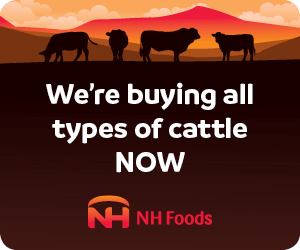
NAPCo’s soon-to-be launched beef brand, Five Founders, will carry a strong environmental message underpinned by carbon neutrality
AS PART of its move towards launching a branded beef program in coming months, the North Australian Pastoral Co has strengthened its environmental credentials, becoming Australia’s first corporate cattle producer to embrace carbon neutral status.
The company’s soon-to-be launched Five Founders beef brand will carry a brand provenance story around whole-of-life management, animal care and environmental attributes.
“We have cattle grazing pastures now which have been continuously grazed for 140 years, and to me that is sustainability in action,” says former NAPCo managing director Nigel Alexander, a great-great grandson of one of the company’s founders, in the brand’s pre-launch awareness.
NAPCo’s general manager for corporate & commercial affairs, Stephen Moore, a member of the Red Meat Advisory Council group which developed the Australian Beef Sustainability Framework was guest speaker at the Queensland Rural Press Club lunch on Thursday. He provided a summary of the ABSF’s 2019 annual update, released last week, and touched on the company’s move to carbon neutrality.

NAPCo’s general manager for corporate & commercial affairs, Stephen Moore
“Carbon neutrality is something we are still learning about – we don’t think it is yet an exact science,” Mr Moore told Beef Central.
“Understanding our carbon footprint is a big learning process, but we have to start somewhere,” he said.
In order to achieve its carbon-neutral claim, NAPCo had its carbon footprint independently measured and calculated, leading to accreditation under the National Carbon Offset Standard (NCOS).
As part of the claim process, the company purchased carbon offsets both on the domestic and international markets.
“But the real journey for us is into the future – how we can make progress and rely less on purchased offsets and more on picking up benefits in what we do in our everyday management practises,” Mr Moore said.
“There’s no single path – it will be an accumulation of things that add up to carbon reduction. At this stage it’s still very much a collaboration between the research community, the pastoral side, and also government. Everybody plays a role in finding a pathway forward in carbon mitigation,” he said.
“There’s also lots of different views about the best way to go about this is – but ultimately NAPCo would like to get to a point where we can claim carbon neutrality without having to buy carbon credits to do it,” Mr Moore said.
“Doing it off our own bat is the ultimate goal, but it’s a journey to reduce reliance on purchasing offsets.”
 He said NAPCo managers and staff had in fact been moving down the carbon reduction path for some years, through simple projects like solar pumping of water, for example.
He said NAPCo managers and staff had in fact been moving down the carbon reduction path for some years, through simple projects like solar pumping of water, for example.
“It’s already being done – we just haven’t recorded it previously. We’re starting to record and report on some of this activity – both for shareholders’ benefit, but also for beef brand development. There’s an increased focus on this sort of thing.”
“Whether it is feed additives, greater adoption of solar energy, or bio-digesters in feedlots or abattoirs, there’s a lot happening in this space, which can help reduce carbon footprint,” Mr Moore said.
People in the industry are starting to understand more about their carbon emission profile, full stop – and increasingly were seeing it as an important issue to keep in front of.
“it’s a good thing for the beef industry, we need to embrace it and promote it – and it’s something we can do really well,” he said.
“Ultimately it’s the animal that we need to focus on: is there something we can feed the animal that’s going to decrease that methane emission? There’s interesting research being done around feed additives like certain forms of algae seaweed that look promising – and we want to be part of that conversation.”
“An important part of this is not only the social license and our journey towards becoming better at what we do. Ultimately we’re all selling a product, and we want to get paid a premium for doing things better,” Mr Moore said.
“That premium might be around environmental claims, being carbon neutral or other features – and we want to understand that.
“Ultimately it’s going to be a big driver of consumer behaviour. If you are going to change what you do and become better, you’re going to want to access a market that is prepared to pay a premium for that,” he said.
